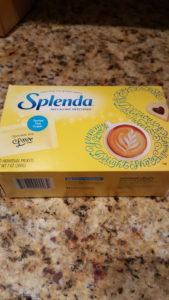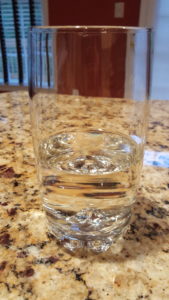The answer might seem almost obvious to most people. If someone was trying to lose weight, do you think people would do better drinking water or drinking diet soda? Some might say water while others might say it doesn't matter – since they both have zero calories. You'd think this would be an easy issue to resolve. Problem was, few researchers actually looked at this controversy. Now, an interesting study has been published which sheds some light on the answer.
Weight Loss: Water Or Diet Soda?
The study was published in 2016 and titled Beneficial effects of replacing diet beverages with water on type 2 diabetic obese women following a hypo-energetic diet: A randomized, 24-week clinical trial.  The title says a lot about who this study involved but here are the specifics:
The title says a lot about who this study involved but here are the specifics:
The study lasted 24 weeks (6 months) and involved 81 overweight Iranian women who had type II diabetes. The women were randomly broken up into two groups:
- Water group
- Diet soda group
The women in each group were all put on a weight loss program that consisted of reduced calories and moderate exercise, 60 minutes a day, 5 days a week.
The women were instructed to drink either water or diet soda after their biggest meal of the day (in this case it was lunch).
In both cases the women consumed the same volume of liquid (about 8 oz) after lunch and were told to abstain from using artificial sweeteners in any other beverages.
The women also started the program during the same point during their menstrual cycle, to reduce any impact this might have on weight gain.
Who Lost The Most Weight?
After the study, researchers noted that the women who drank water lost significantly more weight than those who drank diet soda.
Specifically, women drinking water lost an average of about 14 pounds. Those drinking diet soda lost an average of about 11 pounds.
In  addition Body mass index (BMI), also dropped more in those who drank water. The water group decreased BMI by 2.49 inches while the BMI in the diet soda group dropped by about 2.06 inches.
addition Body mass index (BMI), also dropped more in those who drank water. The water group decreased BMI by 2.49 inches while the BMI in the diet soda group dropped by about 2.06 inches.
Body Mass Index (BMI) is a common measurement of being overweight. For most people, as BMI increased, so to does the risk of various health issues like diabetes, cancer, high blood pressure and others.
Interestingly, there was no significant changes in waste circumference – the area around the tummy. This is odd given that the people lose weight and BMI decreased.
Did Water Or Diet Soda Change Insulin?
Insulin sensitivity is one way to see how progressed diabetes is getting. When insulin sensitivity gets better, it means the insulin is working better at lowering blood sugar. When insulin sensitivity gets worse, it means insulin isnt doing its job and diabetes is getting worse.
In this study, the women who drank water saw better improvements in insulin sensitivity compared to diet soda drinkers. Blood sugar levels at rest were also better in the water drinkers.
Hemoglobin A1C (also called “A1C” or “HbA1C) is a measurement of long term blood sugar control. This is basically a measurement of “sugar coated hemoglobin.” Normally about 5% or less of hemoglobin (which is located inside your red blood cells) is coated with sugar. As diabetes gets worse, your AIC number increases.
Oddly, the researchers did not find a difference in hemoglobin A1C levels between water and diet soda drinkers. I can only speculate on why this is. The study did last 6 months, which should be long enough to noticed significant differences. The lack of difference could be because there was only a few pounds difference in weight loss between groups. Another idea may be that the artificial sweater in the diet soda changed how the bacteria in the digestive system functioned. See below for more on that.
Why The Difference?
Both diet soda and water have zero calories, especially when such a small amount of both were consumed (about 8 oz). So, if that is the case, how did water-drinkers show better improvements than women who had diet soda?
Well, some research suggests that artificial sweeteners can alter the gut microbiome– the bacteria that live inside of us.
There is also evidence that bacteria from overweight people are better able to breakdown food than those of thinner people. The better the bacteria can break down food, means the more energy (calories) are absorbed.
One interesting study gave bacteria from an overweight person to a skinny mouse. Even though the calories the mouse ate did not change, the mouse still gained weight. Evidence like this is what has people buzzing over how our gut bacteria play a role in obesity.
Could the artificial sweeteners in the diet soda altered the bacteria in the body and changed them such that the women absorbed more of the calories that they were eating?
It's an interesting possibility but since this study did not address how the diet soda altered gut probiotics, it's unknown.
Problems With The Study
This study has gotten a lot of attention from the main stream media. While it is an intriguing investigation, the researchers did not tell us what brand of diet soda the women used If we knew that, we might be able to get an idea of which artificial sweetener was used. This might lend support – or not – to my theory above on why diet soda drinkers didn't lose as much weight as water drinkers.
The study also did not define what “moderate exercise” consisted of. Was it walking, biking or something else? Knowing the type of moderate exercise performed could help not only future researchers who try to duplicate this study, but also the average person who wants to try to replicate it in her or himself.
What Is The Take Home Message?
I'll be honest. I like diet coke and it was a little difficult for me to kick the habit. I also admit to liking Splenda too (I know…No hate mail please). That said, if this study is to be believed -and I have no reason not to believe it – then it would make more sense to drink water rather than diet soda if someone were trying to lose weight. While at the end of the day, I still believe it's about “calories in vs. calories out” this study hints that things are more complicated and something else might be going on that could help or hinder our long term weight loss goals.

Water! When in doubt the simple answer is correct. Drink water.
Hi Mrs. B. I’m inclined to believe this too – but I do admit to liking Coke Zero 🙂